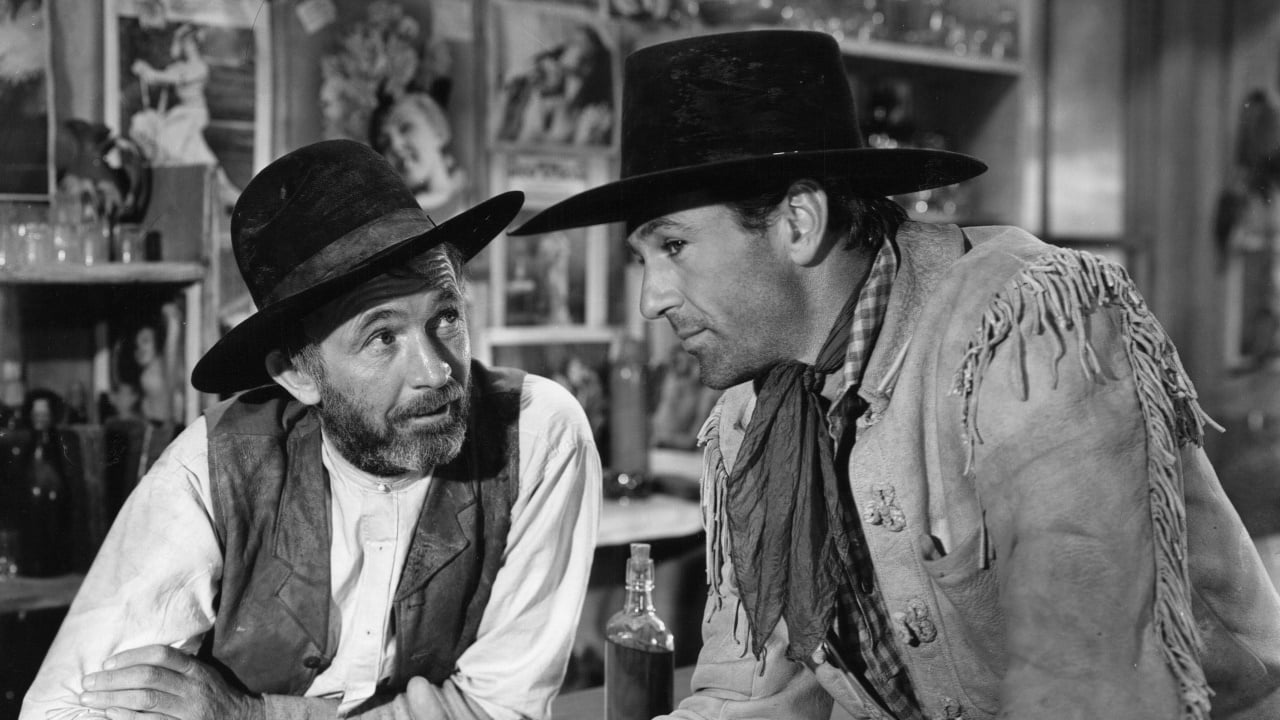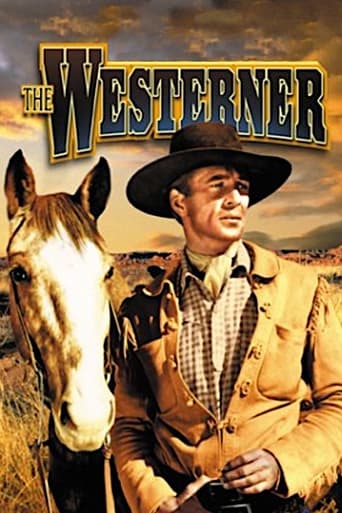

Boring
... View MoreIt's the kind of movie you'll want to see a second time with someone who hasn't seen it yet, to remember what it was like to watch it for the first time.
... View MoreAll of these films share one commonality, that being a kind of emotional center that humanizes a cast of monsters.
... View MoreBy the time the dramatic fireworks start popping off, each one feels earned.
... View MoreI have watched many Westerns in my time: Great, Good, Mediocre and Poor. I must say that "The Westerner" is great, for me one of the best westerns of all time. Cooper and Brennan together were incredible!
... View MoreWilliam Wyler directs a fictionalised account of the story of Judge Roy Bean (Walter Brennan), a small town saloon public official with a penchant for hanging and corrupt as well as he sides with the cattlemen against the homesteaders. Cole Harden (Gary Cooper) is sentenced by the Judge to hang after he is falsely accused of horse stealing. Cole noticing that the Judge is infatuated by the English actress Lily Langtry claims to have met her and even having a lock of her hair.The Judge suspends his sentence and both become unusual friends, Cole even rescues the Judge from some irate homesteaders. However the aggression by the cattlemen leads to one local homesteader Jane Ellen Mathews (Doris Davenport) farms being burned down and her father being killed. She had a tentative romance with Cole and he goes looking for the Judge who does little to protect the homesteaders in the lawless frontier.The film is nicely photographed by the legendary Gregg Toland, it is also overlong, too episodic with too many lulls in the story. It is an offbeat movie but vacillates too often between being a comedy, romance and a drama.
... View MoreThe Westerner, low on the special effects list still delivers such a satisfying punch, with a story that is complicated by character-driven plot turns, that the overall effect is one of real history. Based on the actual existence of at least one character Judge Roy Ben, the movie weaves together a fabric of fiction and history at once based on the myth of the West, while countering it to allow the viewer into a tale that fulfills every expectation.In his saloon in the town of Vinegaroon, Texas Judge Roy Bean (Walter Brennan) holds court and proclaims himself the only law west of the Pecos. When Cole Harden (Gary Cooper) is brought before him for judgment on a horse stealing charge it appears that the good-natured drifter will be hanged by the judge. When Cole notices the many images of the famed performer Lilly Langtry around the saloon he begins spinning a tale of his friendship with the woman, intriguing the judge and causing a suspended sentence to be handed down on the agreement t that Cole will give the judge a lock of the woman's hair that he has hidden in El Paso. The judge develops a strange admiration for Cole and the men become friendly until a local homesteader Jane Ellen Mathews (Doris Davenport) comes to the judge to complain of his hanging one of her hands. It seems the aggression between the cattlemen, which Judge Ben supports, and the homesteaders is bubbling over and Jane and her father who have a small farm are being pushed out. When Bean initiates a fire that destroys Jane's farm and kills her father Cole gets an arrest warrant and has himself deputized to arrest the judge, but a shoot-out erupts ending in tragedy.Much has been said of Gary Cooper's quiet, subtle acting technique and here it is in great form, but the real prize is Walter Brenan who plays the real-life Judge Bean with a host of idiosyncrasies that completely humanize the legendary figure. It becomes clear that the judge is abusing his power as a law enforcer in order to bilk money from those who are brought before him, but Brenan justifies all his character's motivations, and even when the motives are less than pure, we still can't help but find him lovable.The film takes fetishism to unreliable heights for a film from the 40s. The supposed lock of hair belonging to Lilly Langtry that Cole uses as leverage to escape sentencing is played against hold so much obsessive power of Judge Bean that Brennan positively drools over the talisman in the scene when Cooper's Cole hands it over to him. This is strange and new for a western and adds to the list of lore about the legendary judge that history has risen to mythic levels.As the love interest in the movie we know from the get-go that Cole and Jane represent the hope for the future in the ugly rough western land. And much of the earned success of the films characters will be at the expense of land, property, and loyalties. This sacrificing of the characters basic desires for something else, something with more valuable long-term effects leaves the films finale with a tainted sense of hope.The film runs a little long for one from 1940, and this is due to the way that director William Wyler works to allow the characters to tell their story and shape the film. If you fell at times that the plot drags, you will surely be drawn to how the actors are sculpting the tale. It's one you will return to again to see the great perfs from Walter Brennan and Gary Cooper.
... View MoreAn intriguing Western which mixed drama, comedy and romance, The Westerner was well-directed and acted. It is these qualities which notes The Westerner as a quality feature.Gary Cooper leads the cast as drifter Cole Harden wandering into a long-standing battle between homesteaders and cattle herders in Vinegaroon, Texas. Being acquainted with self-righteous 'Judge' Rob Bean (Walter Brennan) whose antics have made him powerful amongst the cattle herders and Jane-Ellen Mathews (Doris Davenport), a homesteader who becomes Harden's love interest. Attempting to act as mediator, Harden has to deal with consequences stemming from his peaceful means. You may think this synopsis sounds like a straight-up Western with shootouts and fiery romance abound. However the characterisation offered great depth which are played out and explored.As an antagonist 'Judge' Bean was never one-dimensional. Whereas delivering his own form of 'justice' with no remorse and continuously conveying a leering arrogance, Bean has an obsession with starlet Lily Langtry. Adoring her pictures across his saloon, Langtry becomes a symbol for Bean's greed, selfishness and desire. Worthy opposition arrived through Harden, upping the ante in a clever game of wits between Bean getting themselves into situations which were marvellously performed by Cooper and Brennan. Their chemistry made The Westerner transformations into different genres work.The Westerner also knew how to balance generic concepts neither becoming too dramatic or comical. After the execution of a condemned man comes along the over-zealous undertaker portrayed as a laughable opportunist. Thinking Harden will be his next profit the undertaker sly-fully takes his measurements. Once Harden is spared a hanging the undertaker's reply "I've just lost a customer". This line's delivery and meaning showcased the dynamics The Westerner had to be a quality feature.
... View More